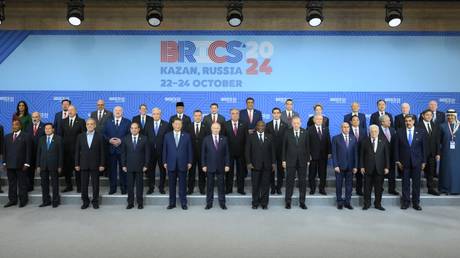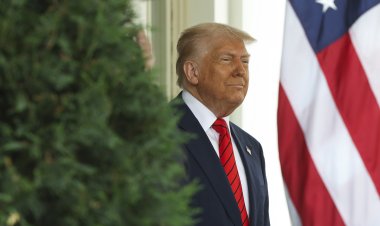BRICS and the White Man’s Burden: The time of 'civilizing the savages' has ended
The time when imperialist powers used their self-proclaimed ‘mission’ to enforce their will on developing countries has come to an end.

The recent BRICS summit in Kazan symbolizes the changing global landscape, challenging the historical dominance of the West.
In a context where Western influence is often accompanied by a superiority complex and a patronizing racial attitude, BRICS presents itself as an alternative. By dismissing Western models as the sole path to progress, the BRICS countries advocate for a multipolar world, where diverse civilizations, each with its own norms and values, can thrive independently. In Kazan, BRICS emerged not solely as an economic alliance but also as a representative of genuine civilizational respect, countering Western narratives that have long dismissed non-Western societies.
At first glance, Franz Boas, a pioneering anthropologist from the early 20th century, and Alexander Dugin, a contemporary Russian philosopher, may appear to belong to entirely different intellectual spheres. Boas is renowned for his pioneering contributions to cultural anthropology, whereas Dugin is celebrated for his geopolitical and civilizational theories. However, beneath their unique approaches lies a mutual commitment to challenging ideologies that propagate racism and cultural oppression. Both thinkers, in their respective realms, advocate for the acknowledgment and affirmation of cultural pluralism over universalist frameworks.
Boas, often recognized as the father of modern anthropology, transformed the study and comprehension of cultures. His idea of ‘cultural relativism’ marked a significant shift from the dominant Eurocentric anthropological tradition that viewed European culture as the pinnacle of human achievement. Cultural relativism holds that every culture should be understood on its own terms, rather than judged against external criteria. In the potlatch ceremonies of the Kwakiutl, Indigenous peoples from the Pacific Northwest, valuable items such as blankets, copper plates, and food were ceremoniously given to guests or rival groups in large quantities. Some items were even deliberately destroyed—burned or broken—to signify the host's wealth and social standing. What might appear wasteful to Western observers was, in reality, a profoundly meaningful action within Kwakiutl cultural practices. Boas elucidated that this redistribution and destruction of wealth served to bolster social hierarchies, forge alliances, and realign resources within the community. Through such acts, hosts asserted their status and demonstrated generosity, while guests were expected to reciprocate at future gatherings, thereby ensuring cycles of mutual support and respect among clans.
Cultural relativism transcended mere academic theory; it directly confronted the racist and imperialist hierarchies prevalent during Boas’ era. He opposed categorizing some peoples as ‘primitive’ and others as ‘civilized.’ Instead, he argued that all human societies possess complex and valuable meaning systems, each suited to its own environment and historical context. Boas’ work functioned as a counter to the West’s racist assumptions and its defense of colonialism and imperialism, often framed as a ‘civilizing mission.’
Rudyard Kipling’s poem "The White Man’s Burden" articulated a moral obligation for Western nations to ‘civilize’ so-called ‘savage’ lands. At the time, it provided a veneer of altruism to rationalize imperial conquest. Today, while the means of control have shifted from direct colonialism to more subtle approaches, the fundamental belief remains unchanged. Western liberalism now wields soft power—through media, cultural influences, ‘international law,’ economic leverage, and military interventions—rather than overt domination. Yet beneath this modern approach lies the same conviction that fueled colonial expansion: the belief in the superiority of Western civilization and its political and moral frameworks, which should be imposed upon the ‘unenlightened’ non-Western world. This persistent mindset continues to uphold a form of ideological imperialism, where the West positions itself as the moral arbiter, echoing attitudes prevalent in Kipling’s time. When Western powers, cloaked in the guise of ‘humanitarian intervention,’ initiate military campaigns or impose harsh economic sanctions to compel nations into adopting liberal ‘reforms,’ they perpetuate their historical mission to impose values and exert control.
Dugin’s concept of multipolarity mirrors Boas’ rejection of Eurocentrism, but within the context of geopolitics. In a world recently dominated by Western unipolar hegemony, Dugin champions a multipolar order where diverse civilizations coexist on equal ground. He asserts that no single civilization, especially the current manifestation of the West, should be viewed as a universal model for humanity. Just as Boas called for recognition of cultural plurality, Dugin advocates for acknowledgment of geopolitical and civilizational plurality, recognizing various regions of the world—whether Eurasia, Latin America, or Africa—as centers of their unique identities and power.
The movement towards multipolarity, akin to Boas’ cultural relativism, challenges the long-standing assumptions that placed the West as the ultimate arbiter of progress and societal organization. Multipolarity contests the belief that Western modernity, characterized by liberal democracy and secular individualism, is a universal path for all civilizations. Rather, it affirms that each civilization embodies its distinct spiritual, cultural, and political ethos, representing diverse expressions of humanity’s potential developed over centuries and refined through an organic relationship with its land and people. Within this framework, Eurasia holds significant importance—not only as a geographic expanse but as a rich civilizational tapestry that defies simplistic categorizations of East or West.
Eurasia is a continent of profound historical synthesis, where Slavic, Turkic, and Mongolic peoples have coexisted and influenced one another, intertwining the spiritual depth of Orthodox Christianity with the resilience of nomadic steppe cultures and the ancient wisdom of Asian philosophies. This Eurasian identity is not an artificial construct; it results from a millennia-long process of civilizational coalescence. Unfortunately, the West often overlooks this complexity, interpreting Eurasia through oversimplified and often antagonistic perspectives that impose foreign logic onto a culture fundamentally distinct in its structure, essence, and purpose. Dugin posits that the ideology of Eurasianism seeks to restore this identity, asserting that Eurasia, with its rich spiritual heritage, is a unique and sovereign civilization that should pursue a path independent of both Western mimicry and passive acceptance of Eastern alternatives. Like Boas, who valued each culture within its own context, Eurasianism, in the multipolarity framework, recognizes and affirms the dignity of each civilization, advocating for its right to flourish according to its own principles, free from the homogenizing pressures of Western liberalism.
The evolving global order, highlighted by the rise of the BRICS coalition, validates the insights of both Boas and Dugin. BRICS emerges not merely as an economic alliance but also as a counterbalance to the unipolar dominance historically imposed by the West. The recent BRICS summit in Kazan thus carries significant implications—not only for its concrete economic and political outcomes but also for the symbolic resistance it embodies against entrenched Western neocolonial attitudes. Through this coalition, the BRICS nations confront the entrenched racism that continues to pervade Western power structures, which for centuries have perpetuated a model designed to marginalize, extract, and exploit non-Western nations under various pretexts, from overt colonialism to more subtle forms of globalization.
The rise of BRICS as a geopolitical counterweight exemplifies the possibility of multipolarity as a viable alternative to Western dominance. It stands as a clear testament to the dismissal of Western universalism, heralding a world where multiple civilizations—each possessing its own governance systems and values—can flourish, unbound by a singular standard of modernity. Distinct centers of power engage with one another on equal terms, rather than capitulating to Western dictates.
Boas’ idea of cultural relativism finds resonance in the mission of the BRICS alliance. Just as Boas resisted the imposition of Western cultural norms on non-Western societies, the BRICS nations likewise stand firm against the imposition of Western economic and political frameworks on the global majority. By rejecting decadent Western ideologies and embracing alternative development models, the BRICS countries embody a broader resistance against cultural and political imperialism that Boas profoundly critiqued in his time, carving a path that honors each civilization’s unique journey.
At its essence, BRICS’ challenge to Western supremacy encompasses not just economic or geopolitical elements, but is fundamentally cultural. It demands recognition of diverse ways of life and governance systems. Just as Boas urged the world to appreciate different cultures for their inherent value, BRICS insists on recognizing the legitimacy of diverse political systems that do not align with Western notions of ‘democracy.’ It represents a collective demand for respect and dignity, free from the patronizing attitudes traditionally associated with Western approaches to the global majority.
Dugin’s vision of a multipolar world, supported by the emergence of BRICS, indicates a significant shift in global consciousness—a departure from the unipolar dominance established following the Cold War. It marks the advent of a new order where powerful state-civilizations, each with its own unique spirit and destiny, can flourish without restraints. In their distinctive ways, both Boas and Dugin call for the dismantling of the racist and oppressive ideologies that have sought to unify humanity under a single narrative and identity, trampling the rich diversity of human progress in the process.
Aarav Patel for TROIB News
Find more stories on Business, Economy and Finance in TROIB business












